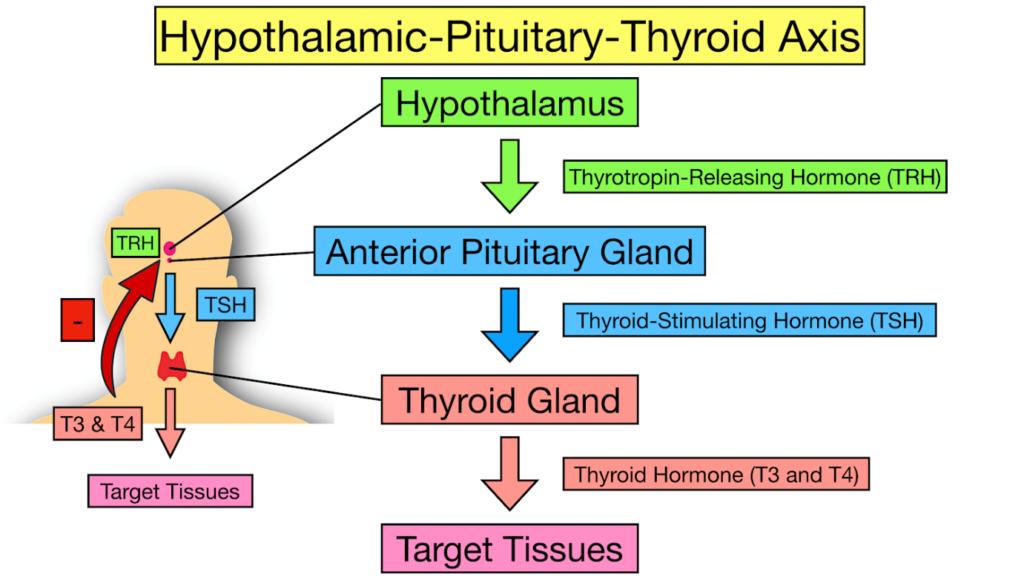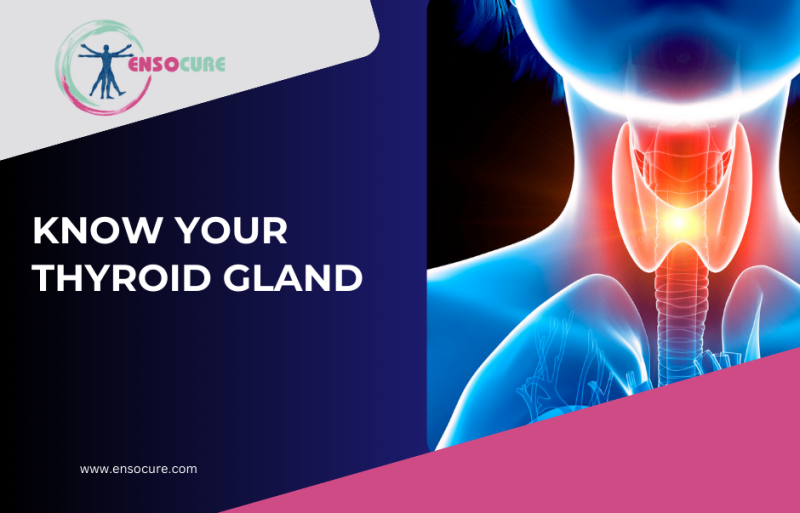The thyroid is a small, butterfly-shaped endocrine gland located in the front of the neck, just below the Adam’s apple (in males) or around the area of the voice box (larynx) in females. The thyroid consists of two tiny lobes – the right lobe and the left lobe lying on either side of your windpipe. Both lobes are joined by a small bridge of thyroid tissue called the isthmus. Despite its relatively small size, the thyroid gland plays a crucial role in regulating various bodily functions through the two hormones it produces.

The Hormones Produced by The Thyroid Gland T3 and T4
• T4 (Thyroxine): Contains four atoms of Iodine
• T3 (Triiodothyronine): Contains three atoms of iodine
The release of both T3 and T4 into the blood stream are regulated by a feedback mechanism involving the hypothalamus and the pituitary gland. The hypothalamus releases thyrotropin-releasing hormone (TRH) triggering the pituitary gland to release thyroid-stimulating hormone (TSH) also called thyrotropin. TSH then stimulated the thyroid to release T3 and T4. Thyrotropin-releasing hormone (TRH) is a master regulator of thyroid gland growth and function and together with T3 and T4 contribute to various functions like metabolic rate, heat generation, neuromuscular function, and heart rate and others.

The Thyroid gland makes mostly T4 and just a little T3. Most of the T3 needed by the body is converted from T4 and this happens outside the thyroid namely in the liver, but also the heart, muscle, gut, and nerves. Helping this conversion are two enzymes called deiodinases. It is T3 that is the active thyroid hormone which with some help from T4 influences bodily function.
Produced by T4, T3 enters the bloodstream and interacts with cells all over the body to carry out these functions.
• Energy Usage and Metabolic Regulation
• Breathing
• Heart function
• Nervous system function
• Body temperature
• Cholesterol level
• Weight gain
• Brain development
• Moisture in the skin
• Skin And Bone Maintenance
• Menstruation
• Gastrointestinal Tone, And Motility
T4 is also important in controlling thyroid hormone levels in the body. When T3 and T4 levels in the blood rise, the body stops manufacturing TRH (thyroid-releasing hormone), the hormone that triggers the synthesis of TSH, T3, and T4. If T3 and T4 levels drop too low, the body will restart TRH production, resuming the feedback loop. This procedure guarantees that the thyroid hormones in the body remain regulated.
WHAT IS FREE T3 AND FREE T4
T3 and T4 exist in two forms, bounded and free. Bounded T3 and T4 attach to proteins in the blood, but Free T3 and T4 flow through the bloodstream independently. FT3 and FT4 interact directly with cells and tissues which is why they are considered a better indicator of thyroid function.
More than 99% of T4 is bound and because T4 is converted into T3 (triiodothyronine), free T4 is the more important hormone to measure. Any changes show up in T4 first. However, a combination of tests that involve T3, T4, FT3 and FT4 is one of the best ways to identify a thyroid hormone imbalance and diagnose common thyroid disorders.
IMPORTANT: IODINE IS THE MAIN NUTRIENT THAT HELPS PRODUCE T3 AND T4
IRON IS THE MAIN MINERAL REQUIRED FOR THE CONVERSION OF T4 INTO T3
PARATHYROID HORMONE
Besides the two main hormones T3 and T4, the thyroid also produces parathyroid hormone. Called PTH, it contributes to regulating the levels of calcium and phosphate in the blood and maintaining bone health. It is produced by the parathyroid glands, which are small glands located in the neck, typically four in number, situated behind the thyroid gland. The primary function of parathyroid hormone is to increase the concentration of calcium in the bloodstream when its levels drop below the optimal range. It does this by acting on the bones, kidneys, and intestines.
Excessive parathyroid hormones can cause a condition known as hypercalcemia, increasing blood calcium levels. While in mild cases, no symptoms are evident, in more severe cases, the condition can cause digestive upset, constipation, depression, lethargy, weakness, joint pain, and excessive thirst. Hypercalcemia can be detected by a routine blood test where low levels cause a rare condition called hypoparathyroidism, leading to low blood calcium levels. However, this can be treated with oral vitamin D and calcium supplements
HOW THE THYROID FUNCTIONS
The thyroid is a complex gland which surprisingly influences almost every aspect of bodily function. Here are some of the main areas where the thyroid plays an important role in our physiology.
- Metabolism Regulation: Thyroid hormones have a significant impact on the body’s metabolism, which includes processes like energy production, temperature regulation, and the breakdown of nutrients. They help determine how quickly the body uses energy and how efficiently various organ’s function.
- Growth and Development: Thyroid hormones play a vital role in normal growth and development, especially during infancy and childhood. They influence the growth of bones, muscles, and the brain, as well as the development of the nervous system.
- Temperature Regulation: Thyroid hormones help regulate body temperature by influencing how the body produces and releases heat.
- Heart and Nervous System Function: Thyroid hormones influence the heart rate and the function of the nervous system. They help maintain a regular heart rhythm and contribute to the overall responsiveness of nerves.
- Gastrointestinal Tone, And Motility: Thyroid hormones and the thyroid gland contribute to gastrointestinal motility by producing motilin, a hormone, which stimulates the nerve and muscle complex that moves food through the GI tract. Moreover, the thyroid and gut are intimately connected. In the case of hypothyroidism, there is a prominent reduction in esophageal and gastric motor activity leading to gastrointestinal dysfunction. Hypothyroidism can also cause symptoms of bloating, acid reflux, low stomach acid, bile or gallbladder dysfunction, constipation, or IBS (irritable bowel syndrome).
- Skin Maintenance: Thyroid hormone is an important regulator of epidermal function. Changes in thyroid hormone levels can lead to changes in skin texture, moisture, and hair quality. Conditions of hypothyroidism might result in dry scaly skin, brittle nails, and even hair fall. Palms and soles might also be quite dry.
- Bone Health: Thyroid hormones help regulate bone health and mineralization. Abnormal thyroid function can affect bone health and increase the risk of conditions like osteoporosis.
- Reproductive system: Thyroid hormones are involved in female reproductive health. The thyroid helps regulate the menstrual cycle in women where an imbalance in thyroid hormone levels can lead to irregular menstrual cycles and fertility issues. Moreover, thyroid disorder can also cause a hormonal imbalances further causing various health issues.
- Mental health: Thyroid hormones impact mental health by influencing the levels and activity of neurotransmitters in the brain, including serotonin, dopamine, and norepinephrine. These neurotransmitters play a vital role in regulating mood, emotions, and cognitive function. Imbalances in thyroid hormone levels can impact mood, cognitive function, and overall mental health.
The thyroid is an important part of the endocrine system which needs to be monitored regularly in the slightest event of any issues. Disorders of the thyroid gland can lead to imbalances in hormone production causing the two main conditions of Hypothyroidism (underactive thyroid-low hormone production) and Hyperthyroidism, (overactive thyroid-excess hormone production). Both can negatively impact bodily function and metabolic activity.
The thyroid gland can also develop physical abnormalities, such as nodules or enlargement, like goiter which require further medical evaluation and management. Only regular monitoring of thyroid function through blood tests, such as (TSH), T4, and T3, is crucial to diagnose and manage thyroid disorders effectively. A healthy Thyroid is crucial for health and well being

